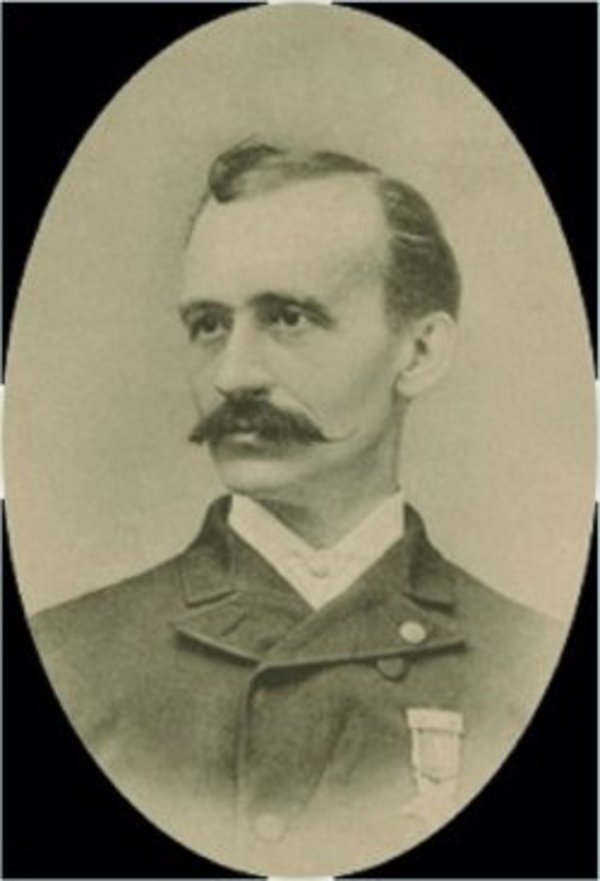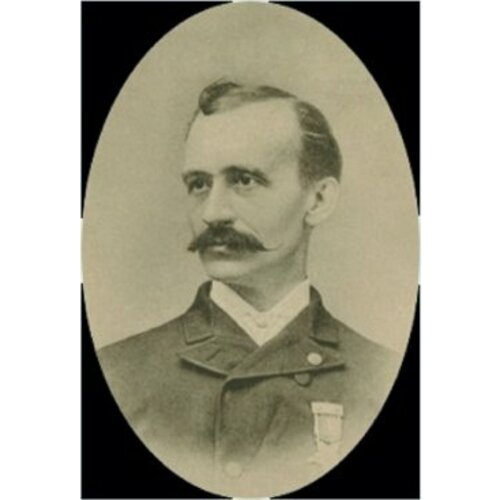
Source: Link
BEACH, THOMAS BILLIS (also known as Henri Le Caron and Dr Howard), secret agent and author; b. 26 Sept. 1841 in Colchester, England, son of John Joseph Billis Beach and Maria Passmore; d. 1 April 1894 in South Kensington (London), England.
Thomas Billis Beach was the second son in a cooper’s family of 13. Nothing is known of his early education. After two attempts to run away to London, he was apprenticed at age 12 to a draper. When he was 16 he secured work as a clerk in a London drapery firm. Two years later, in 1859, he went to Paris where he found employment with Arthur and Company, an English banking house that handled American business.
Excited by news of the outbreak of the American Civil War, Beach travelled to New York, where he enlisted in the 8th Pennsylvanian Reserves of the Union army on 7 Aug. 1861. Seemingly motivated by a love of secrecy, he assumed the name of Henri Le Caron and gave his nationality as French. He served in Virginia and was then sent west in 1862. There his usefulness in scouting and on patrols led to his promotion. In July 1864 he was gazetted second lieutenant and he rose rapidly to the rank of major before his demobilization in 1866.
In 1865 Le Caron had married Nannie Melville, the daughter of an Irish planter of Virginia. They would have six children. After the war he settled in Nashville, Tenn., and studied medicine. He renewed contact with a wartime acquaintance, John O’Neill*, who introduced him to leading members of the Fenian Brotherhood, including General Thomas William Sweeny, secretary of war in the wing of the organization led by William Randall Roberts which was planning a second invasion of the Canadas. Le Caron sent reports on Fenian projects to his father in England, who showed them to the Liberal mp for Colchester, John Gurdon Rebow. Impressed with the reports, Rebow turned them over to the Home Office.
On a visit to England in 1867 Le Caron was introduced to Rebow, who arranged a secret meeting between Le Caron and Robert Anderson, a civil servant attached to the office of the Irish secretary. Anderson recruited Le Caron as a paid agent and thenceforth Anderson acted as Le Caron’s principal link with the British government.
When, at the end of 1867, O’Neill was placed in charge of further Fenian operations against Canada, Le Caron was able to penetrate into the inner circles of Fenian leadership. Abandoning his medical studies and a post he had taken up in Illinois, he took the Fenian oath, becoming a head centre (an executive position) and a military organizer, later rising to the rank of colonel. Thus, he was able to provide Anderson with detailed reports of Fenian plans. In the spring of 1868 Le Caron met with Canadian police commissioner Gilbert McMicken and made arrangements to transmit information to him on a regular basis. He spoke to McMicken again near the frontier in February 1870 and warned him that a Fenian raid on Canada was impending. The Canadian government was therefore prepared when O’Neill attacked at Eccles-Hill, near Frelighsburg, Que., on 25 May. Le Caron, who was in charge of Fenian munitions during the raid, did what he could to create havoc in the Fenian ranks.
After the raid Le Caron travelled to Montreal, to consult police magistrate Charles-Joseph Coursol*, and then proceeded to Ottawa by way of Cornwall, Ont. In Cornwall he was arrested as a Fenian and taken under escort to McMicken in Ottawa. He was welcomed there as a hero by the few who knew of his role and was then secretly released to return to the United States. Le Caron’s report of the raid marked the high point in his career as a secret agent. The following year, 1871, he warned the Canadian government of the plans of William Bernard O’Donoghue* to enlist the Fenians in an invasion of Manitoba. After completing his medical studies, he practised in Braidwood, Ill., and eventually owned several drugstores. He continued to serve as agent for the British government until 1889, joining the Clan-na-Gael, an offshoot of the Fenians which was organized in 1867. For a brief time in 1881 Le Caron was liaison officer between the Clan and the Irish political leader Charles Stewart Parnell. When the organization planned a dynamite war against England, Le Caron was able to provide information that ultimately led to the arrest of 25 terrorists. Yet he could not discover all the plans of the dynamite campaign and there were a number of explosions in London. Despite the arrests, Le Caron remained in the confidence of the Clan until he created a sensation by testifying in England against Parnell in 1889. His testimony provided the limelight that he had avoided all his life but had secretly desired.
Le Caron could easily master minor skills and had a gift for winning the confidence of influential people, hence the ease with which he found employment and the rapidity of his promotion in the Union army. His work as a secret agent gave him a sense of importance that was a sufficient reward for most of his career. In the end, however, he felt a need for public recognition, which he secured by his testimony against Parnell.
Because of subsequent Fenian threats to his life, Beach assumed a second alias, Dr Howard, and remained under police protection in London where he wrote his memoirs, published in 1892. He died two years later of appendicitis. After his death, his widow and their four daughters returned to the United States.
Thomas Billis Beach is the author of Twenty-five years in the secret service: the recollections of a spy (London, 1892), which he published under the pseudonym of Henri Le Caron.
NA, MG 26, A, 244. PRO, CO 42/686. Times (London), 2, 29 April 1894. DNB. Robert Anderson, Sidelights on the Home Rule movement (London, 1906). J. A. Cole, Prince of spies, Henri Le Caron (London and Boston, 1984). Léon Ó Broin, The prime informer: a suppressed scandal (London, [1971]). Hereward Senior, The Fenians and Canada (Toronto, 1978). K. R. M. Short, The dynamite war; Irish American bombers in Victorian Britain (Atlantic Highlands, N.J., and Dublin, 1979). John Sweeney, At Scotland Yard; being the experiences during twenty seven years’ service of John Sweeney . . . , ed. Francis Richards (London, 1904). Charles Curran, “The spy behind the speaker’s chair,” Hist. Today (London), 28 (1968): 745–54.
Cite This Article
Hereward Senior, “BEACH, THOMAS BILLIS (Henri Le Caron, Dr Howard),” in Dictionary of Canadian Biography, vol. 12, University of Toronto/Université Laval, 2003–, accessed December 21, 2024, https://www.biographi.ca/en/bio/beach_thomas_billis_12E.html.
The citation above shows the format for footnotes and endnotes according to the Chicago manual of style (16th edition). Information to be used in other citation formats:
| Permalink: | https://www.biographi.ca/en/bio/beach_thomas_billis_12E.html |
| Author of Article: | Hereward Senior |
| Title of Article: | BEACH, THOMAS BILLIS (Henri Le Caron, Dr Howard) |
| Publication Name: | Dictionary of Canadian Biography, vol. 12 |
| Publisher: | University of Toronto/Université Laval |
| Year of publication: | 1990 |
| Year of revision: | 1990 |
| Access Date: | December 21, 2024 |



